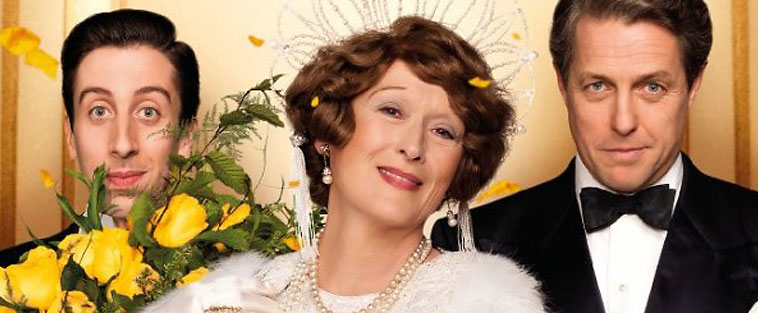By Steven Krage
Before you continue on to reading my review of Florence Foster Jenkins, I must implore you to listen to the YouTube video below, as it creates a more brilliant introduction than I could ever hope to muster.
As a classical musician, there is nothing I hate more than people ridiculing my art. When the only representations of opera singers in the media are fat, sweaty tenors and sopranos the size of battle cruisers, you tend to be pessimistic as to whether or not it is possible to portray a passion for classical music in a way that a modern audience would find inspiring.
In the most unorthodox way, Florence Foster Jenkins proves that classical music, though often seen as stuffy and alienating, stems from a burning adoration for the art of bringing music to life.
The movie, which opened on August 12, tells the true story of Florence Foster Jenkins, a moneyed society matron with a love for classical music who, after funding musical organizations for decades, decides to try her hand at being a concert singer. Sadly, her total and utter disregard for pitch, breath, and phrasing coalesce to make her into a perfect stereotype of the dreaded amateur who doesn’t know how terrible she sounds. Yet her true and deep love for music imbues itself enough into her performances to project her love for the material to the audience, consisting mostly of fellow society matrons and patrons of the arts.
The plot chronicles Jenkins, who, after seeing a recital given by opera singer Lily Pons and conducted by her friend Arturo Toscanini, decides that she wants to go back to taking voice lessons, hires an accompanist, and performs her unique brand of caterwauling for a paying audience. It is the ultimate incarnation of “The Emperor’s New Clothes,” yet with a protagonist that inspires pity as well as admiration in the audience.
Though the story is entirely true, with a terrible cast the film would be quite an embarrassing farce indeed, but thankfully we are spared that. The main trio are ideal for their roles. Hugh Grant, as Foster’s husband, St. Clair Bayfield, portrays a man who deeply loves Jenkins, despite the absence of sexuality between them. As Jenkins puts together her recitals, it is up to Bayfield to pay off critics, screen possible attendees who are “true music lovers,” and keep his wife from falling to bits. Grant ably conveys the man’ true adoration for Florence while simultaneously having a passionate, yet sanctioned affair with Kathleen, played by Rebecca Ferguson, who might as well have been a cardboard cut-out for all we are concerned. The part is rotten, flat, and pointless, and the acting on the part of Ferguson is laughable at best. You most certainly don’t miss her when she fades out of the plot around the midway point.
Every good recitalist needs an accompanist, and that role is filled by Cosme McMoon, brought to brilliant Technicolor by The Big Bang Theory’s Simon Helberg. His reactions are quick, his characterization comic, yet brilliantly underplayed. Helberg is well on his way to being the next Gene Wilder, as there is more than a fair share of Leo Bloom in his mannerisms. McMoon is torn between keeping his reputation as a classical pianist and making music with Jenkins, who he truly admires. The smaller roles, especially Nina Arianda’s initially stereotypical but eventually inspiring chorus-girl-turned-second-wife Agnes Stark, who stands up for Jenkins during the climax of the piece.
 Meryl Streep as Florence Foster Jenkins
Meryl Streep as Florence Foster Jenkins
That leaves Florence Foster Jenkins herself and, while I may be redundant in saying this, is there anything Meryl Streep can’t do? Streep takes a character that in the wrong hands could be a slapstick travesty and breathes life into her, portraying a woman that is passionate about her art, husband, and responsibilities, yet wants more. Her Jenkins knows that a disease will eventually kill her, yet is determined to live a full life, despite death being a “constant companion” for 50 years of her life. It also takes a genius to be able to re-create Jenkins’s massacre of a singing voice, and Streep gives it her all, combining the scooping, flat tone and remaining on top of the comedy that this allows the seasoned artist. She is able to portray a woman with a fire to perform, but imbues the proceedings with a vulnerability that brought a tear to this audience member’s eye.
The ensemble is brilliantly led by director Stephan Frears, written to perfection by Nicholas Martin, and scored with reserve and dramatic underpinning by Alexandre Desplat, who had worked on Streep’s Julie & Julia.
Those of you who may have trouble with sitting through an almost two-hour movie about a tone-deaf wannabe opera singer should leave your predilections at the door and lose yourself in the true story of a woman who, despite a lack of talent, makes up for it with passion, drive, and an overwhelming need for life and all the joy it brings.
And, just as Jenkins’s voice was the ultimate introduction, it is also the only conclusion I have to offer, despite my advice to see this sweet, moving tribute to an artist that comes along once in a million years.
This article is reposted from Steven Krage’s blog at ChicagoNow.

